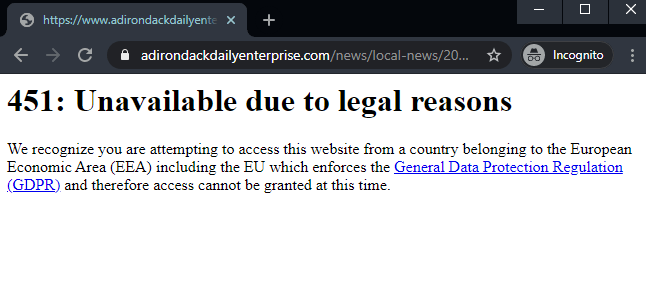451 Unavailable For Legal Reasons meaning in English
451 Unavailable For Legal Reasons
Status
451 Unavailable For Legal Reasons
Usage of the 451 Unavailable For Legal Reasons HTTP status response code is suitable for situations where a resource must be blocked for legal reasons, such as where a court judgement or law requires that content should be made unavailable.
451 has been used widely by US news/media sites following the introduction of EU 'GDPR' privacy regulations, blocking content for EU visitors.
The 451 HTTP status was actually only introduced quite recently in 2016 - in order to provide more information than previous alternatives such as 403 forbidden.
Origin
The origin of the 451 HTTP response code is a reference to the dystopian novel Fahrenheit 451 by Ray Bradbury.
Published in 1953, 451 is explained in the book to be the temperature at which paper burns.
What type of HTTP status is a 451?
A 451 is in the 4xx class of status codes which are client error based.
Example 451 response
Example of a 451 HTTP response shown to EU website users:

Example 451 response in the Chrome network tab:
When should a 451 response be used?
A 451 response is suitable for any situation whereby a court or other legal entity has mandated that a web resource must be removed or blocked.
Examples might include: criminal court cases, civil court cases, tribunals, statutes/laws, treaties, or simply a request from a company legal department.
DMCA and GDPR based situations are two instances where a 451 may appropriate.
A 451 response does not necessarily have to be served globally. For example many US news sites show a 451 status and message to European users to get around GDPR privacy requirements.
Rel="Blocked-By"
A 451 HTTP response may contain a rel="blocked-by" Link header, indicating the entity implementing the block.
Link: <https://spqr.example.org/legislatione>; rel="blocked-by"
Code language: HTTP (http)Does a 451 HTTP status affect SEO?
If you want to block all users for legal reasons - then a 451 code is perfect - and will also likely remove your resource from search engines.
If Google are unable to access a resource it is likely that they will not index it. If all users/bots that attempt to access a resource are served with a 451 response and no content, it will not be indexed.
However from testing conducted at the time of writing: if US users and Googlebot are able to access the content then this content will be indexable/potentially available in Google search.
How to fix a 451 response?
If a site you are visiting is displaying a 451 HTTP code that means the page is unavailable for legal reasons. This isn't an error that you can fix.
If your site is showing a 451 and you are unsure why, you may want to contact your hosting company, developers or site administrator.
Specification
This status code indicates that the server is denying access to the resource as a consequence of a legal demand.
The server in question might not be an origin server. This type of legal demand typically most directly affects the operations of ISPs and search engines.
Responses using this status code SHOULD include an explanation, in the response body, of the details of the legal demand: the party making it, the applicable legislation or regulation, and what classes of person and resource it applies to. For example:
HTTP/1.1 451 Unavailable For Legal Reasons
Link: <https://spqr.example.org/legislatione>; rel="blocked-by"
Content-Type: text/html
<html>
<head><title>Unavailable For Legal Reasons</title></head>
<body>
<h1>Unavailable For Legal Reasons</h1>
<p>This request may not be serviced in the Roman Province of Judea due to the Lex Julia Majestatis, which disallows access to resources hosted on servers deemed to be operated by the People's Front of Judea.</p>
</body>
</html>
The use of the 451 status code implies neither the existence nor nonexistence of the resource named in the request. That is to say, it is possible that if the legal demands were removed, a request for the resource still might not succeed.
Note that in many cases clients can still access the denied resource by using technical countermeasures such as a VPN or the Tor network.
A 451 response is cacheable by default, i.e., unless otherwise indicated by the method definition or explicit cache controls; see [RFC7234].Code language: HTML, XML (xml)HTTP Response Status Codes List
200 OK, 301 Moved Permanently, 302 Found, 303 See Other, 307 Temporary Redirect, 308 Permanent Redirect, 403 Forbidden, 404 Not Found, 410 Gone, 451 Unavailable For Legal Reasons, 500 Internal Server Error
Citation URL
https://www.searchcandy.uk/seo/seo-glossary/http-451/